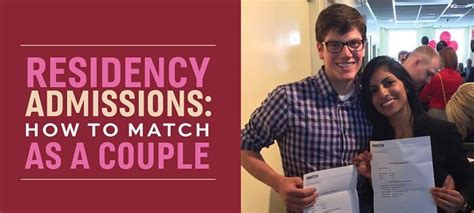Introduction

For couples in medical school or residency, the prospect of matching into the same residency program can bring both excitement and trepidation. Matching together can provide immense support and stability, allowing both partners to advance their careers while maintaining their relationship. However, the process can be highly competitive and requires careful planning and strategic decision-making. This guide will provide couples with a comprehensive overview of the Couples Match Residency process, including strategies for increasing their chances of matching together and navigating the emotional challenges that may arise along the way.
Understanding the Couples Match System
The Couples Match Residency System is a separate application process for couples who wish to complete their residency training at the same institution. Couples apply through the National Resident Matching Program (NRMP) and submit a single application that ranks both partners’ preferences for residency programs. The system then uses an algorithm to match couples to programs that have mutually ranked them highly.
Key Statistics
- In 2022, approximately 1,700 couples applied through the Couples Match Residency System.
- The overall match rate for couples is typically lower than for individuals, hovering around 60-70%.
- The competitiveness of the Couples Match varies by specialty, with highly competitive specialties such as surgery and dermatology having lower match rates.
Factors to Consider Before Applying to the Couples Match
- Career goals: Couples should align their career goals and ensure they are both committed to pursuing residency in the same or compatible specialties.
- Flexibility: Willingness to compromise and consider alternative programs that have ranked both partners highly is crucial.
- Communication: Open and honest communication throughout the process is essential for managing expectations and making informed decisions.
- Emotional support: Couples should be prepared to provide each other with emotional support and encouragement, especially during times of stress.
Strategies for Increasing Your Chances of Matching Together
- Research programs thoroughly: Visit programs’ websites, attend virtual or in-person information sessions, and connect with current residents to gain insights into the programs’ cultures and training opportunities.
- Rank programs strategically: Couples should consider the competitiveness of the programs they are applying to and rank them accordingly. It is generally not advised to rank programs that have not explicitly ranked both partners highly.
- Maximize applications: Apply to a sufficient number of programs to increase your chances of matching. Consider applying to both categorical and preliminary programs within your specialties of interest.
- Attend the NRMP Interview Day: The NRMP Interview Day is an opportunity for couples to interview with multiple programs on the same day. This can save time and travel expenses and allow for a more efficient interview process.
- Showcase your compatibility: During interviews, couples should demonstrate their strong relationship, shared values, and commitment to supporting each other’s careers.
Tips for Navigating the Emotional Challenges of the Couples Match
- Manage expectations: Couples should be realistic about their chances of matching together and prepare for the possibility of not matching at the same institution.
- Communicate frequently: Open and honest communication throughout the process is crucial for managing emotions and coping with any disappointments or setbacks.
- Seek support: Couples can benefit from seeking support from family, friends, or a therapist to help them navigate the emotional challenges of the Couples Match.
- Consider the “off-cycle” Match: If couples do not match together, they can consider applying through the “off-cycle” Match, which occurs after the traditional Match Day.
Tables for Strategic Planning
Table 1: Factors Influencing the Couples Match Rate by Specialty
| Specialty | Match Rate |
|---|---|
| Family Medicine | 70-80% |
| Internal Medicine | 65-75% |
| Pediatrics | 60-70% |
| Surgery | 50-60% |
| Dermatology | 40-50% |
Table 2: Timeline for the Couples Match Residency Process
| Timeline | Task |
|---|---|
| September – October | Register for the Couples Match Residency System |
| November – December | Submit ERAS applications and receive interview invitations |
| January – March | Attend residency interviews |
| March | Couples Match Interview Day |
| March 17 | Match results released |
Table 3: Essential Communication Skills for Couples Navigating the Couples Match
- Active listening
- Empathy
- Assertiveness
- Conflict resolution
- Compromise
Table 4: Sample Questions to Ask Programs During Interviews
- What is the program’s commitment to supporting couples who match together?
- What resources are available for couples who relocate to the area?
- What opportunities are there for couples to train in different specialties within the institution?
- How does the program promote work-life balance for couples?
Conclusion
The Couples Match Residency process can be both challenging and rewarding for aspiring physicians. By carefully considering the factors involved, developing a strategic approach, and navigating the emotional challenges that may arise, couples can increase their chances of matching together and embarking on a fulfilling career path. Remember that open communication, flexibility, and support are key elements for a successful journey through the Couples Match Residency process.
